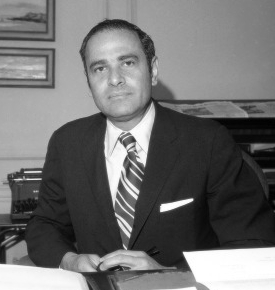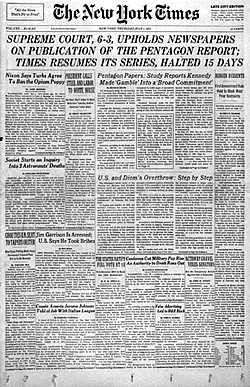Arthur O. Sulzberger of The New York Times
By Arthur O. Sulzberger Jr. The New York Times
Yesterday afternoon, those of you lucky enough to hear Michael Useem learned about the power and danger of what he calls leadership moments -- situations that pose enormous challenges to individuals and to institutions.
Thirty years ago, The New York Times and its publisher, my father Punch Sulzberger, faced just such a defining moment. When Neil Sheehan, a correspondent in our Washington bureau was given a copy of a 47-volume top secret study of the Vietnam War, Punch and The Times were faced with a momentous decision. While it was clear that publicly revealing the Pentagon Papers, as they would become known, could have profound consequences, I doubt that anyone fully understood the extent of the leap that was being taken into the journalistic and, later, the legal void.

Yet, this ex-Marine would not be intimidated by real or imagined threats of civil or criminal liability. Punch gave the go-ahead to publish what may have been the most controversial leak in the 20th Century. And as a result, fundamentally transformed the relationship between the news media and government.
Today, our profession faces another version of this leadership moment. Last year, in an all but secret proceeding, Congress passed the Intelligence Authorization Act, which, had it become law, would have criminalized all unauthorized disclosures of classified information.

Fortunately, members of our industry, under the leadership of Bo Jones, Publisher of The Washington Post, banded together and helped persuade President Clinton to veto this insidious bill. With the change in administration, I fear this legislation may be reintroduced. If it is, all of us -- all of us -- must step up to our leadership moment and make sure that everyone understands what happens to societies that allow secrecy to pervade and cloak their public affairs. We can point to the Pentagon Papers, as we strenuously argue why it is so absolutely necessary for journalists to continue to shine a bright light on the day-to-day operations of government.
Looking back over three decades, my father said of the Pentagon Papers, “What became clear after reading them was that these were extraordinary documents proving deceit of the American people by their elected representatives. I had no doubt but that the American people had a right to read them and that we, at The Times, had an obligation to publish them.”
We, in the press, will always have such an obligation on behalf of our profession, of our readers and of our democracy. If need be, we’ll call on the services of such war-horses as Walter Cronkite and Punch Sulzberger. The other side won’t stand a chance.
Thank you.
This was a "leadership moment" presented at the ASNE Convention April 3, 2001, at the J.W. Marriott Hotel in Washington, D.C.
